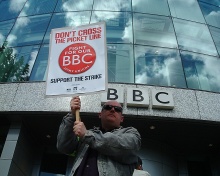Strike ballot planned at BBC

Pickets could be back again, angry about pay, pensions, and job cuts
Unions are to run strike ballots over pay, pensions, and job cuts, among members at the BBC and its subsidiaries.
The decision, made by a joint meeting of BECTU, NUJ, and Musicians' Union representatives in London today, July 10, came after the BBC turned down demands for an improved pay offer and refused to drop a plan for cuts in pension rights.
Talks on the 2006 pay claim stalled when the BBC insisted it would stick with a 2.6% pay offer, even though the inflation rate had moved to 3%. Pension discussions came to an end on July 7 with the management unmoved by union arguments that it should shelve a plan to raise retirement age, staff contributions to pensions, and close its final-salary pension scheme to new staff.
Threats of compulsory redundancy, affecting staff in many areas, will also be included in the list of industrial issues in the ballot of members.
Union representatives voted to run a strike ballot only days after the BBC's Annual Report revealed bumper pay increases for top executives, in a year when more than 1,000 staff were made redundant in order to save money.
Figures in the report also showed that the BBC's pension fund had passed the most difficult of all tests applied to schemes in the UK, the FRS17 accountants' valuation.
This produced a surplus of £170 million, against a shortfall of £422 million in 2005, putting the BBC's pension scheme in an almost unique position compared to other final-salary schemes, most of which fail the FRS17 test each year with massive deficits.
The BBC has supressed the result of another key pension test, the statutory actuarial valuation, which is normally published in its Annual Report, but is missing this year.
Unions believe that this valuation has found a surplus of up to £500m in the BBC's pension fund, casting fatal doubts on the Corporation's claim that cuts need to be made in pension benefits for financial reasons.
Formal 7-day notice of strike ballots is due to be sent to the BBC by July 13, although the unions have not ruled out further discussions with management, or DG Mark Thompson, while ballot preparations are underway.
Ballot papers are expected to be issued on July 20, with a closing date of August 3. Union representatives are due to meet again on the afternoon of August 3 to consider the ballot outcome.
Members in BBC Resources Ltd, and BBC Worldwide Ltd, will also be balloted, but only on the issue of pensions since neither the BBC pay dispute, nor the threat of compulsory redundancies, directly affects them.
If industrial action occurs, most likely in August, it will be the second bout of strike action since Mark Thompson took control two years ago with a tough cost-cutting agenda.
Thompson's vision for the BBC has already seen more than 2,500 staff outsourced, and well over 1,000 made redundant - mostly through voluntary means - with another 2,000 due to follow in the next two years.
Letter to BBC warning of industrial action
The Joint Unions have decided to ballot for industrial action. The reasons for the ballot are the changes to the final salary pension scheme, the failure of the BBC to address our claim on pay and compulsory redundancies under Value for Money. The BBC will receive separate notification from each union as to the details of the dispute and the timetable for the ballot.
In the meantime because of the seriousness of the issues involved we would seek an urgent meeting between the national officials and the Director General, Mark Thompson.
We look forward to an early response.
Yours sincerely
Luke Crawley
Supervisory Official
BECTU
10th July 2006
Press release issued by BECTU
Unions ballot for strike action at the BBC
BECTU, the NUJ and Amicus are to ballot their members at the BBC immediately for strike action. This decision was reached today at a central London meeting of senior representatives of the three unions.
They voted unanimously to commence ballot proceedings for strike action over three issues: changes to the BBC pension scheme, a below-inflation pay offer, and the continued threat of compulsory redundancies.
The BBC is proposing to move the retirement age from 60 to 65, increase the staff contribution from 6 to 9%, and introduce a 'career average' pension for new staff.
The pay offer is 2.6% which is below the rate of inflation at a time when inflation is 3% and management awarded themselves increases of between 10 and 30%.
And the continued possibility of compulsory redundancies are the result of the Value for Money changes announced last year.
The corporation will receive formal notice of the ballot this Thursday; ballot papers will be issued the following Thursday 20th July, and the ballot will close two weeks later, on Thursday August 3rd. The unions will be free to commence industrial action from one week after that.
BECTU Assistant General Secretary Gerry Morrissey commented: "BBC management has demonstrated unbelievable hypocrisy in awarding themselves huge pay increases and bonuses while at the same time undermining and devaluing the package of pay and pensions for those staff who have so far avoided compulsory redundancy. I have no doubt that our members will respond with an overwhelming yes vote for strike action and the ball is now firmly back in the court of the Director General".
BECTU Supervisory official Luke Crawley added: "BECTU members are angry at the contempt shown to them by the BBC; asking them to take a pay cut and to work longer is insulting. Adding insult to injury is the executive board's greed in swallowing inflated pay rises of between 10 and 30%. BECTU members will vote for industrial action."
The unions have requested a meeting with the Director General Mark Thompson but any such meeting will not delay the ballot.
Issued 10 July 2006
Amended 11 July 2006
